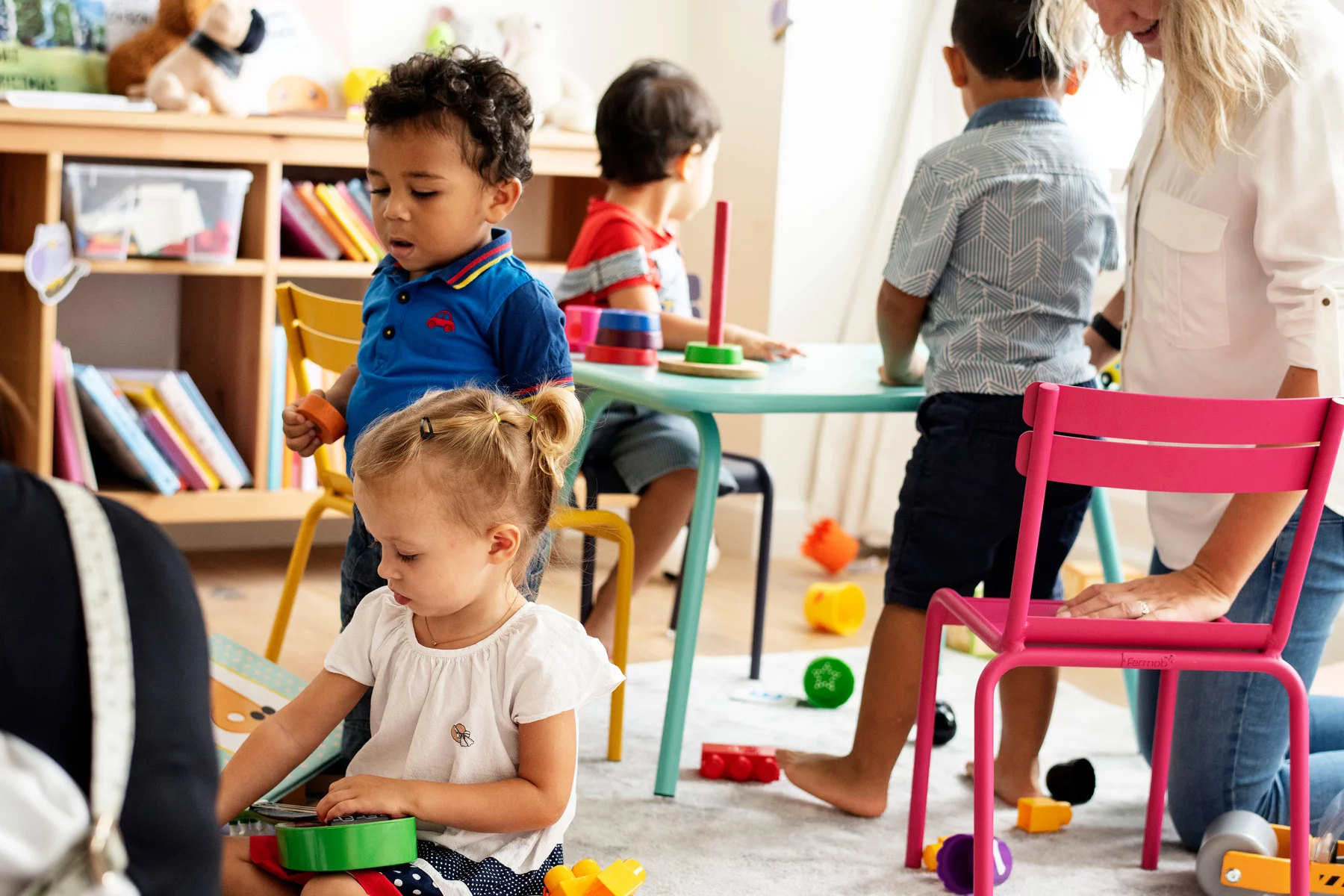Expats thinking about having a baby in Austria will be pleased to know that the quality of care available throughout the country is exceptional. This is hardly surprising, however, given the excellent healthcare system in Austria, which includes top-quality women’s healthcare services. Add to that the plethora of health insurance options and supportive child benefits and you know that you and your little one are in safe hands.
But before you get stuck into your pre-baby to-do list, however, here is everything you need to know about having a baby in Austria, including:
- Pregnancy and childbirth in Austria
- Accessing maternity services in Austria
- Insurance for maternity costs in Austria
- Prenatal care in Austria
- Giving birth in Austria
- Postnatal care after having a baby in Austria
- Registering a birth after having a baby in Austria
- Non-residents, visitors, and tourists giving birth in Austria
- Parental leave in Austria
- Child benefits in Austria
- Useful resources
Cigna Global
Expecting a baby in Austria? Enjoy peace of mind with Cigna Global’s private healthcare. Gain access to top maternity care, pediatricians, specialists, and a global network tailor-made for your growing family. Start your parenting journey with confidence – Cigna Global has you covered.
Pregnancy and childbirth in Austria
As the standard of healthcare in Austria is exceptionally high, so too is the standard of women’s healthcare and everything concerning childbirth. This is good news for expats looking to start – or extend – their family in the country. Essentially, midwives are always present during the birth of a baby. That said, there are no statistics readily available for how many midwives actually deliver babies versus gynecologists.
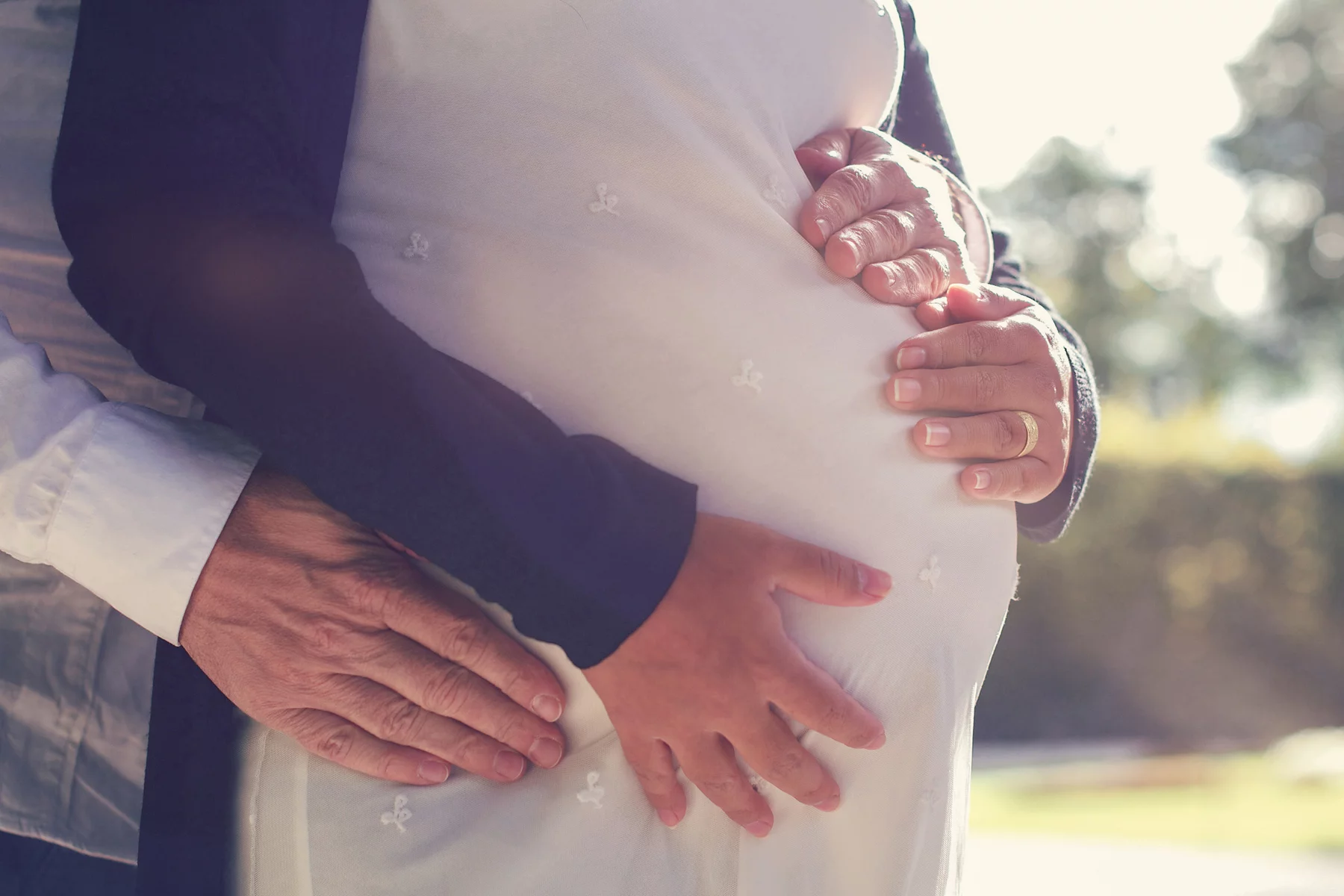
Generally, it is very uncommon to have a home birth in Austria, even though it is an option. In fact, only 2% of women chose to have their baby at home as of 2015. The majority of births take place in hospitals or maternity centers. There are also private hospitals available in Austria. Typically, they will provide a higher level of comfort and privacy than traditional Austrian hospitals. That said, the level of care will still be similar to state hospitals.
Since the mid-1980s, Austrian fertility has remained remarkably stable. As of 2014, for instance, the average was 1.46 births per woman. As of 2019, only 5 women die from pregnancy-related causes for every 100,000 live births – a rate that has remained steady since 2006. By comparison, the United States has a ratio of 17 maternal deaths per 100,000 births. In 2020, the infant mortality rate in Austria was 3.62 deaths per 1,000 live births, which is considered low.
Accessing maternity services in Austria
Once you have arranged your health insurance, you can choose your own doctor, or ask around for a referral. However, you should make sure that the doctor you choose accepts your insurance carrier. Essentially, Austria’s system caters to both public and private insurance users, so you won’t find accessing women’s healthcare difficult when having a baby in Austria. That said, the public sector is dealing with long waiting lists and getting an appointment in time may be challenging. As such, you may want to consider private health insurance to access quality healthcare more quickly.
Insurance for maternity costs in Austria
Fortunately, in Austria, all maternity costs are covered by state insurance. Whether you are a citizen of the EU visiting or living in Austria, you will have access to the local public health insurance system. You can access this by using your European Health Insurance Card (EHIC). From hospital stays to ultrasounds and blood work, this is all free of charge with your health insurance.
Importantly, Austria’s public healthcare system is built on mandatory health insurance. If you are an expat, your public health insurance will go through your employer. You can then sign up with a gynecologist or obstetrician.
Learn more about private and public health insurance by reading our dedicated country article.
Prenatal care in Austria
Obviously, you will want to give your baby (or babies) the best start you can in life. Initially, once you know you are pregnant, you can begin looking into your prenatal care options.
Antenatal appointments
Essentially, antenatal appointments are extremely well planned out in Austria and provide you with all the information you need during your pregnancy. After your obstetrician has confirmed your pregnancy, you will receive a Mutter-Kind-Pass (Mother-Child-Booklet), also known as a ‘MuKi’. This will take you through all your appointments, vaccines, and tests for both you and your child, right up until their fifth birthday.
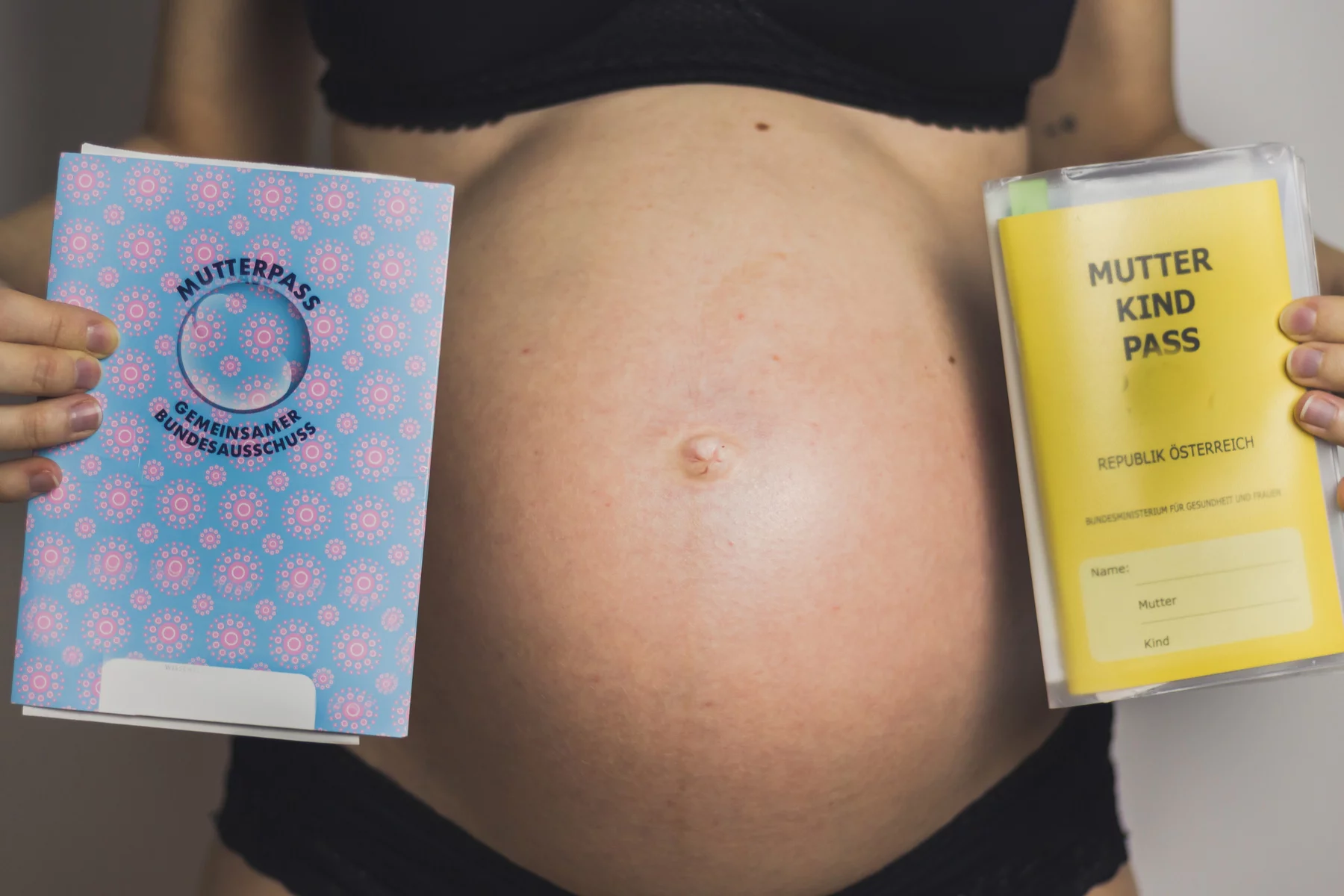
Legally, you need to have a doctor’s confirmation before your 14th week of pregnancy to access all the benefits of your health insurance. Your doctor will give you all the documents you need for your 16 weeks of maternity leave. In addition, when you get closer to your due date, you will get a midwife who can help you with all your questions and prepare your birth plan.
Scans, tests, and checks
You will find all your prenatal examinations in the Mutter-Kind-Pass. Your doctor will issue it to you around your 12th week of pregnancy. Generally, it will include the following:
- maternal health screening
- routine screening tests including ultrasounds (these will tell you how likely it is that your baby has certain health conditions)
- diagnostic tests – for pregnancies at increased risk (these tell you more accurately if your baby has a certain health condition).
In addition, the Austrian Federal Office for Safety in Health Care (BASG) recommends the flu vaccine for pregnant women.
Antenatal classes
Principally, doctors recommend antenatal classes for all soon-to-be-parents to prepare them mentally and physically for the challenges of birth and parenthood.
In Austria, you can find birthing classes through the following:
- Maternity wards of all hospitals
- Midwives
- Adult education schools (Volkshochschulen)
Giving birth in Austria
When you are having a baby in Austria, you have the option of giving birth in a hospital, at home, or what is called an outpatient birth. This is where you deliver in a hospital but if there are no complications, you can leave with your baby only a few hours later. Then, your Hebamme (midwife) and pediatrician will deliver care to you inside your own home. For this option, it is necessary to find a midwife and pediatrician as early in your pregnancy as possible.

If you are giving birth at the hospital, you are able to have one person to accompany you in the delivery room. This can be your partner, a family member, or a friend.
If you are able to walk around, you can leave the hospital just six hours after giving birth. But you can also stay overnight if you wish. If you leave within four days, your health insurance fund will cover the cost of your postnatal care. However, if your baby was born premature, or you have had twins or multiple babies, the length of stay will be entirely dependent on the child’s or children’s development. If you have had a cesarean, you may leave as soon as the fifth day after giving birth. After this, your midwife can also visit you at home. If you leave before the sixth day, your health insurance fund will pay for your care.
Postnatal care after having a baby in Austria
Postnatal care is particularly important for outpatient and home births. If you have an outpatient birth, your pediatrician will visit you to examine the baby after it is born. Then, your midwife will come each day for at least the first five days. If you have private insurance and you want the support, a midwife can also visit every day after a home birth. Your midwife will weigh your baby, help with breastfeeding, check how any scars you have are healing, and chat to you about your mental health. Again, your Mutter-Kind-Pass will dictate all your doctor’s appointments for you and your baby.
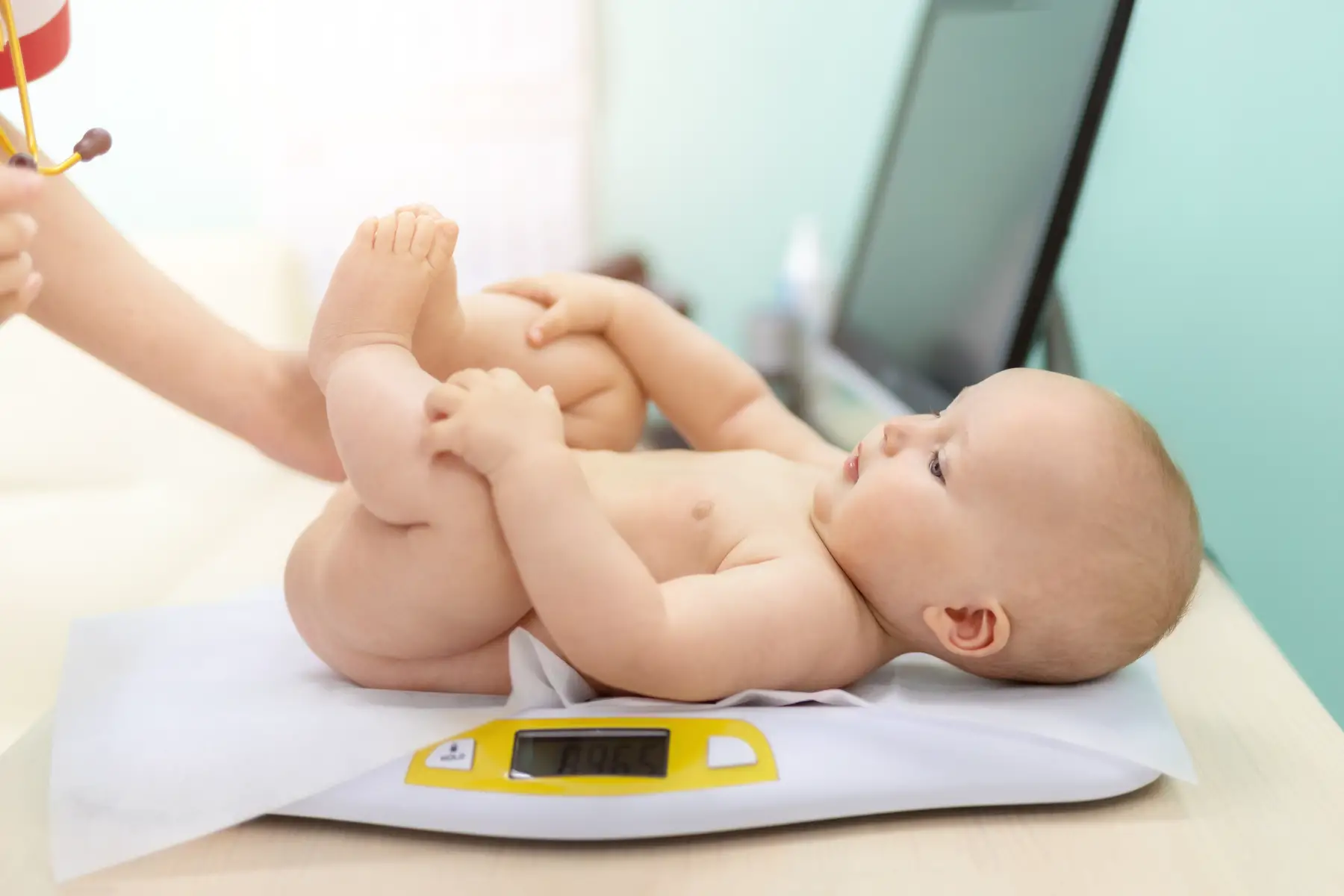
Fortunately, there are plenty of postnatal classes that you can enroll in to meet other new mothers and keep active during the often confusing time that follows bringing a child into the world. Generally, birthing hospitals throughout Austria offer courses such as baby massage and yoga with children.
Vienna’s parent and child centers also offer antenatal classes that are free of charge and open to everyone. However, the main language is generally German. These centers are also great places to take your newborn to get their daily measurements and see how they are developing.
Vaccinations
Interestingly, vaccinations are voluntary in Austria. Parents can decide whether, when, and for which diseases their child will have vaccinations against. In all, there are currently 12 free vaccines for children up to 15 years. Initially, the vaccination program starts with the following: diphtheria, tetanus, pertussis, poliomyelitis, hepatitis B, HIB, pneumococcal vaccine, rotavirus, and the combined vaccine against measles, mumps, rubella (MMR) for children aged 0 to 6 years old.
Nurseries and childcare
Generally, you should sign your child up as soon as possible after birth for a crèche, kindergarten, or daycare facility. You can do this through your local municipal office or the magistrate. For Vienna kindergartens, check out the Stadt Wien website about kindergarten and afterschool care.
Ordinarily, mothers in Austria stay at home for a full year, if not longer, after giving birth. This is largely because it is not easy to find a daycare that accepts children under the age of one. However, by age three, all children are eligible for a spot. That said, a large percentage of kids will begin before then when maternity leave ends.

Sebastian Arthofer
Krankenversichern
Insider tip: Kindergartens
Start looking for a kindergarten spot as early as your child’s first year. Currently, Austria faces a significant shortage of kindergartens and qualified kindergarten teachers, making early planning essential to avoid long waiting lists and limited availability.
Breastfeeding
In Austria, breastfeeding is common. However, by six months, exclusive breastfeeding generally declines to just 10% of women. Usually, both hospitals and midwives in Austria offer lactation services. This is available both before and after birth.
You can also read more about views on breastfeeding around the world in our guide.
Registering a birth after having a baby in Austria
Usually, if you give birth in a hospital, the hospital will automatically register the birth for you at the local register office. Additionally, you will get a Meldezettel (a residential registration form). And, if your child is an Austrian citizen, you will get a Staatsbürgerschaftsnachweis (proof of citizenship). Birth registration is free of charge as are the Geburtsurkunde (birth certificate) and proof of citizenship. However, if you choose to have the birth certificate mailed, there is generally a small fee.
Ordinarily, you must register your baby’s birth within one week. You must first have the birth certificate in order to register the birth so you should apply for this within three days of having a home birth.
To register your child’s birth, you will need the following documents:
- Birth certificates of both parents
- Marriage certificate of the child’s parents
- Proof of nationality of the child’s parents
- If your principal residence is abroad, you will need proof of address
- Child’s first name (if you have decided on a first name)
- Anzeige der Geburt (registering a birth) form (only if the birth was not registered by the head of the hospital, the physician, or the midwife)
You can find your register office or Standesamt oder Standesamtsverband of the municipality (in German) here.
Non-residents, visitors, and tourists giving birth in Austria
Luckily, healthcare in Austria is accessible to everyone in the country. Essentially, this means that tourists and temporary visitors can access Austrian healthcare. However, they may be charged the full price. Therefore, it is wise to take out travel insurance before you enter Austria. Companies such as World Nomads offer simple and flexible travel insurance policies that you can buy at home or on the road; therefore, it’s worth exploring.
If you are a holder of the European Health Insurance Card (EHIC) you will have coverage as if you were at home. However, bear in mind that there are differences in each EU country and some prescriptions that are free in your home country might not be free in Austria.
Will your child get Austrian citizenship?
Essentially, after having a baby in Austria, children will become Austrian citizens at the time of their birth, if their mother is an Austrian citizen. The same applies when parents are married and only the father is an Austrian citizen. However, if the parents are not married and the mother has citizenship in another country, the child will get Austrian citizenship after paternity is proven. According to Austrian law, a child may have dual citizenship of another country along with Austrian citizenship.
Parental leave in Austria
Essentially, when compared to many other countries, parental leave after having a baby in Austria is quite generous. Uniquely, Mutterschutz (maternity protection) starts eight weeks before your due date and continues through to between eight and 12 weeks after birth. You are not meant to work during this period and Austrian employers tend to stick to this law pretty strictly.

During Mutterschutz, you will receive full payment of your salary. Pregnant women must let their employer know about their pregnancy and due date as soon as they find out. The employer also needs to let her know when her maternity leave will start four weeks before it is due to begin.
In Austria, Karenz (parental leave) starts when Mutterschutz ends. You will receive Kinderbetreuungsgeld (childcare payments) from your health insurance provider. It is very common in Austria for fathers to share maternity leave with mothers. Remarkably, you are able to switch between the two parents twice during your leave period. However, these switches must be at least two months apart. The payment scheme you choose will depend on how long you want off for parental leave. Basically, the longer your leave, the smaller the rate. During the first year, you’ll get 100% of the base income. In the second year, this is reduced to 50%.
If you have been at your company for over three years, you may request to work part-time. Elternteilzeit (parental part-time) rights mean your employer needs to work with you to find a part-time working solution for you. You have protection again dismissal until your child turns four. The rules state that you can request to change the hours once. Equally, your employer can also request one change to your hours.
Importantly, in 2019, an amendment to the Austrian Paternity Leave Act (VKG) now grants fathers one month of leave after their child is born. They call it ‘Daddy Month’, and it may begin the next day after a child is born. However, the new dad must notify his employer three months before the estimated date of birth.
Child benefits in Austria
Familienbeihilfe (child benefit) is provided in a universal scheme for all Austrian residents. Employers’ contributions and taxes pay for the scheme which covers a child to the age of 18. Along with child benefit, parents will also receive a child tax credit and child-raising allowance. Child benefit is granted on application only. Ultimately, the amount depends on the age of the child. Furthermore, parents with two or more children get an additional supplement.
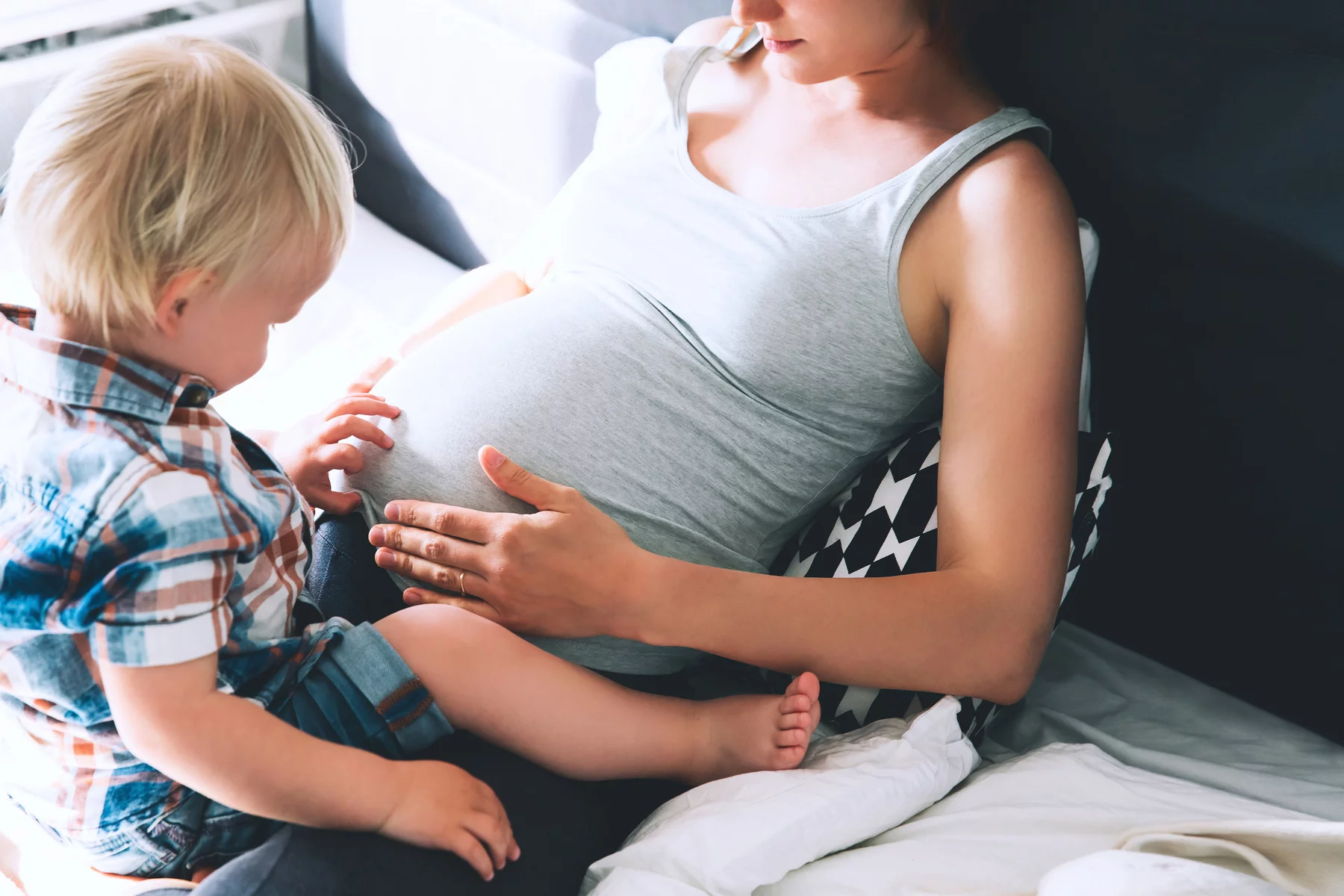
The child tax credit amounts to €58.40 per child per month. This doesn’t require a separate application and will accompany the benefits automatically. The multiple child supplement is for your third and any subsequent child. The bonus is €20 per month and is separate from other child benefits. Typically, you arrange this with the tax office for your place of residence.

Sebastian Arthofer
Krankenversichern
Insider tip: Child benefits
Child benefits are tied to the mandatory Mutter-Kind-Pass examinations. Staying up-to-date with these tests is essential to access financial support and prioritize your child’s health.
Along with the child benefit, a school start allowance (Schulstartgeld) of €100 is paid every September for each child between the ages of six and 15. You don’t need to fill out a separate application for this.
The child-raising allowance allows parents to choose between two schemes: the flexible flat-rate or income-related child care allowance. In essence, the income-related childcare allowance amounts to 80% of the income last earned at a maximum of €66 per day. The flexible rate, meanwhile, allows you to choose less money for a longer period or more money for a shorter period. You will need to fill in the child-raising allowance application form to qualify for this. The handy OECD Tax-Benefit web calculator can also help you stack up the figures.
Useful resources
- Hebammen – allows you to search for a midwife in your area
- Familienberatung – helps you search for family and partner counseling offices in Austria




